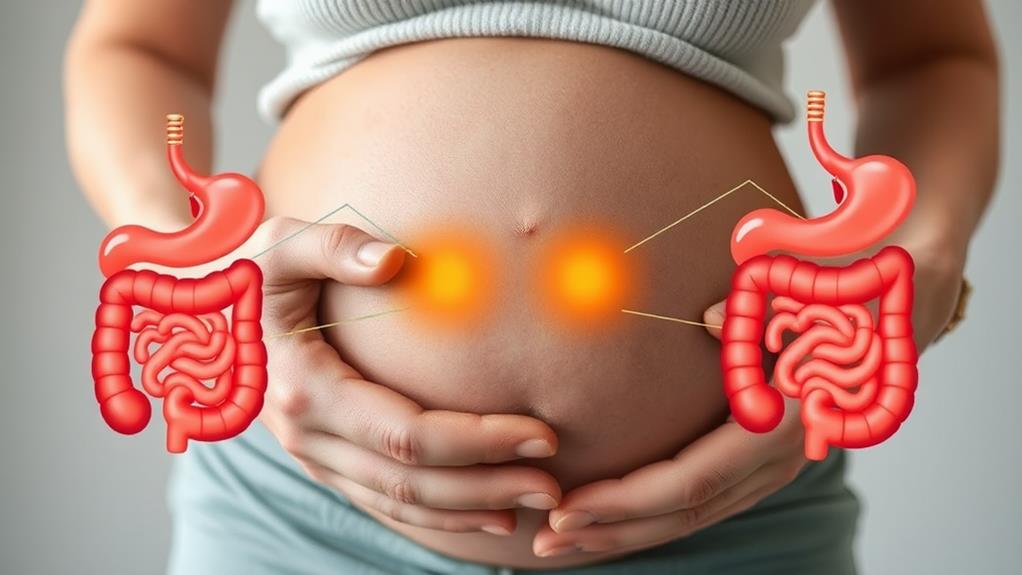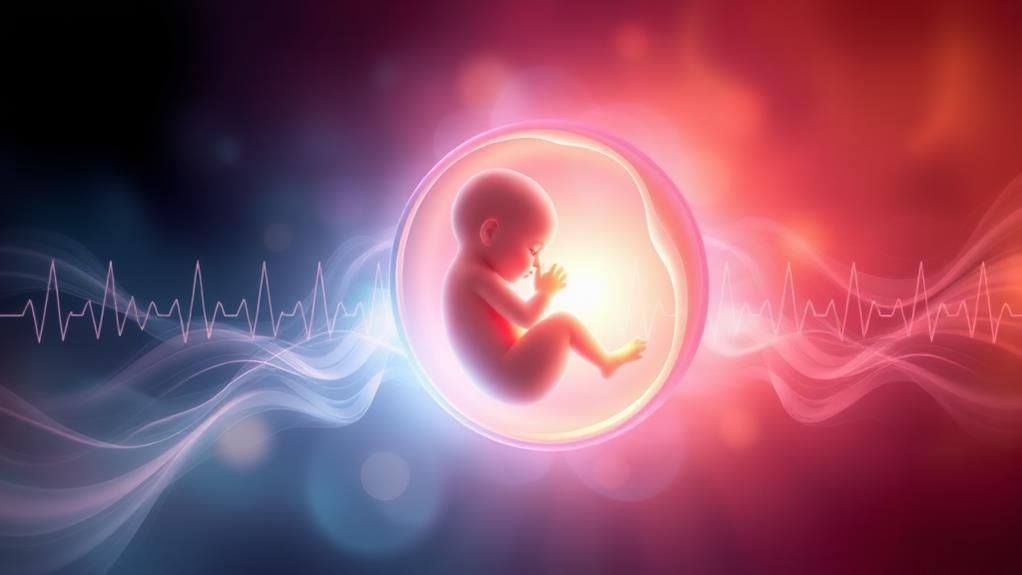Pregnancy Stomach Pain: Causes and When to Seek Help
When you're pregnant, it's not uncommon to experience stomach pain, but understanding the causes can be complex. You might find that mild discomfort is a regular part of your journey, yet knowing when pain signals something more serious is essential. From hormonal changes to gastrointestinal issues and more, the reasons can vary widely. However, there are specific symptoms that shouldn't be ignored. So, what should you keep an eye out for, and when should you reach out to your healthcare provider? The answers could be critical for your peace of mind and your baby's health.
Common Causes of Stomach Pain

Another reason for stomach pain could be gas and bloating. As your hormones change, your digestion slows down, making you feel like a balloon ready to pop. Eating smaller, more frequent meals can help with this.
Constipation is another common culprit, and nobody wants to deal with that! Staying hydrated and eating fiber-rich foods can keep things moving along.
Lastly, round ligament pain can happen as your uterus expands, causing sharp twinges in your lower abdomen. It's normal but can catch you off guard.
If your stomach pain feels severe or you're worried, don't hesitate to call your doctor. It's always better to be safe than sorry!
Normal Discomfort During Pregnancy
While you've learned about common causes of stomach pain, it's important to recognize that some discomfort during pregnancy is completely normal. As your body changes, you might feel tightness in your abdomen, especially as your baby grows. This stretching, while a bit uncomfortable, is a sign that your body is doing what it needs to support your little one.
You might also notice some mild cramping. This can happen as your uterus expands or when your ligaments stretch to accommodate your growing belly. It's like your body's way of saying, "Hey, I'm busy here!" Often, this discomfort isn't anything to worry about.
Some women experience gas and bloating, which can feel like a mini roller coaster in your stomach. It's just your hormones at play, making everything a bit more dramatic.
Remember, it's normal to feel a mix of emotions—and physical sensations—during this time. If you ever feel unsure, don't hesitate to reach out to your doctor. They're there to help you navigate this wild ride of pregnancy.
Just keep in mind, a little discomfort isn't usually a cause for alarm. You're not alone in this journey!
Gastrointestinal Issues

Gastrointestinal issues can become more pronounced during pregnancy due to hormonal changes and physical shifts in your body. You might find yourself experiencing bloating, gas, or even constipation. These symptoms can feel uncomfortable, leaving you wondering what's going on.
As your body adjusts, your digestive system can slow down, making it harder for food to move through. You might also notice that certain foods that didn't bother you before now cause some trouble. Spicy foods, dairy, or high-fiber meals could lead to more gas than you'd like to admit.
But don't worry, it's pretty common! Staying hydrated and eating smaller, more frequent meals can help ease these issues.
If you find that your stomach pain is severe, or if it's accompanied by other symptoms like vomiting or fever, it's time to call your doctor. They can help rule out any serious problems.
Round Ligament Pain
As your pregnancy progresses, you might start to notice a sharp or aching pain in your lower abdomen, which is often attributed to round ligament pain. This type of discomfort happens as your body changes to make room for your growing baby. The round ligaments, which support your uterus, stretch and can cause those sudden twinges.
You may feel this pain when you move quickly, like getting out of bed or standing up too fast. It can catch you off guard, but don't worry—it's usually harmless! It's just your body's way of adjusting.
You might also notice it more during activities like laughing, sneezing, or even coughing.
To ease the pain, try gentle stretching or changing positions slowly. A warm compress can also do wonders, but always check with your doctor first.
Remember, round ligament pain is common, and most pregnant people experience it at some point. If the pain becomes severe or is accompanied by other concerning symptoms, don't hesitate to reach out to your healthcare provider. It's better to be safe than sorry, right?
Plus, they can help guarantee everything's going smoothly with your pregnancy!
Ectopic Pregnancy Symptoms

How can you tell if you're experiencing an ectopic pregnancy? Well, it's important to pay attention to some specific symptoms.
First, you might notice sharp or stabbing pain in your abdomen or pelvis. This pain can often feel one-sided, like a pesky reminder that something's not right. You may also spot some unusual bleeding, which can be a little alarming.
Other signs include feeling dizzy or lightheaded, especially if you stand up quickly. If you find yourself feeling faint or weak, that's definitely a cue to seek help.
Oh, and don't forget about the nausea—it's not just morning sickness! This can happen, too, if you're dealing with an ectopic pregnancy.
If any of these symptoms pop up, it's vital to call your doctor or go to the hospital right away.
Remember, while not every pain means something serious, it's better to be safe than sorry. You're not just a little worried; you're being proactive about your health, and that's always a good thing!
Don't hesitate to reach out for help when you need it. Your well-being matters!
Miscarriage Indicators
Experiencing abdominal pain can be alarming, especially when you're already on high alert for complications like ectopic pregnancy. It's totally normal to feel anxious about your pregnancy, and understanding the signs of a miscarriage can help ease some of that worry.
One key indicator is heavy bleeding. If you notice a lot of blood, especially if it's bright red and accompanied by clots, that's something to take seriously. You might also feel intense cramping, which can feel similar to your menstrual cramps but more severe.
Don't forget about the back pain, either. If it's a sharp pain that doesn't seem to go away, it's worth paying attention to.
Another sign is a sudden loss of pregnancy symptoms. If you were feeling nausea or breast tenderness and suddenly they disappear, it might raise some red flags.
When to Contact Your Doctor

Knowing when to contact your doctor can make a significant difference in your peace of mind during pregnancy. If you're experiencing severe stomach pain, it's always better to be safe than sorry. Trust your instincts—if something feels off, don't hesitate to reach out.
You should definitely call your doctor if the pain is sharp or sudden, or if it's accompanied by heavy bleeding, fever, or chills. These could be signs that something isn't right and needs immediate attention.
Also, if you have pain that doesn't go away after resting or if it gets worse, let your doctor know.
It's normal to worry about your little one, but remember, your health is just as important! Making that call might feel intimidating, but your doctor wants to help you. They can provide guidance on what's normal and what's not. Plus, they can ease your worries, which is a win-win.
Coping Strategies for Pain Relief
During pregnancy, dealing with stomach pain can be challenging, but there are effective coping strategies to help ease your discomfort.
First, try to rest as much as you can. Your body is working hard, and taking breaks can make a big difference. You can also place a warm compress on your stomach. Just be careful—it shouldn't be too hot! A warm bath can also help soothe those aches.
Staying hydrated is super important too. Drinking water can help with digestion and reduce cramping. If you're feeling up to it, gentle exercise like walking or stretching might help relieve tension. Just listen to your body—if it doesn't feel good, stop!
You might also want to keep a food diary. Jotting down what you eat can reveal patterns that trigger your stomach pain.
And don't forget, small, frequent meals instead of three big ones can be easier on your belly.
Lastly, if you're feeling stressed, try deep breathing or meditation. It's amazing what a little calm can do!














Post Comment